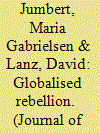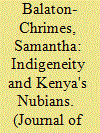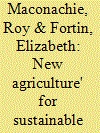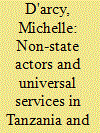|
|
|
Sort Order |
|
|
|
Items / Page
|
|
|
|
|
|
|
| Srl | Item |
| 1 |
ID:
120919


|
|
|
|
|
| Publication |
2013.
|
| Summary/Abstract |
This article is concerned with the rebellion in Darfur as a way to illustrate the politics of insurgency in the era of globalisation. We first show how the Darfur rebels have projected their struggle onto the world stage, before examining the effects that this has engendered. On the one hand, Darfur's global profile solidified the rebels' cause and co-opted international actors in support of it. This translated into real leverage for the rebels, and it constrained the Sudanese government by reducing its ability to use brute force. At the same time, internationalisation encouraged the Darfur rebels to make maximalist demands at the expense of articulating a broader political vision addressing the root causes of conflict. Moreover, the substitution of local legitimacy for international connections lowered the barriers of entry for new groups and thus promoted fragmentation. The combination of these effects makes for intractable conflict scenarios, the current situation in Darfur being a case in point.
|
|
|
|
|
|
|
|
|
|
|
|
|
|
|
|
| 2 |
ID:
120924


|
|
|
|
|
| Publication |
2013.
|
| Summary/Abstract |
Recent studies of indigeneity in Africa have highlighted the problematic nature of the concept in a continent where it is difficult to determine which groups have temporal priority in a given location. These studies have suggested, with varying degrees of criticism, that indigeneity in Africa is a strategic identity deployed to attain a special status and associated benefits, often to remedy past harms. This article agrees that indigeneity is an act of positioning, but suggests that in the Kenyan context it can be deployed in another way as well, that is, as an act that seeks equal rather than special positioning within the dominant population. In this case indigeneity is not a special 'slot' but rather the norm. The article illustrates this by drawing on research with the Nubian community of Nairobi who seek to shed their ethnic stranger status and instead position themselves as indigenous to Nairobi in order to access the same quality of citizenship as that enjoyed by Kenya's '42 tribes'.
|
|
|
|
|
|
|
|
|
|
|
|
|
|
|
|
| 3 |
ID:
120921


|
|
|
|
|
| Publication |
2013.
|
| Summary/Abstract |
In sub-Saharan Africa, commercial bioenergy production has been hailed as a new form of 'green capitalism' that will deliver 'win-win' outcomes and 'pro poor' development. Yet in an era of global economic recession and soaring food prices, biofuel 'sustainability' has been at the centre of controversy. This paper focuses on the case of post-war Sierra Leone, a country that has over the last decade been consistently ranked as one of the poorest in the world, facing food insecurity, high unemployment and entrenched poverty. Following a recent government strategy to secure foreign direct investment in biofuels production in agriculturally rich regions of the country, the largest foreign investment in Sierra Leone since the end of its civil war has been secured: a Swiss company is to invest US$368 million into a large-scale biofuels project over the course of 3 years, and promises to simultaneously stimulate an enabling environment for investment, provide job opportunities for youth and increase food production. For multiple actors involved in the project, the concept of 'sustainability' is crucial but accordingly there are varying interpretations of its meaning. Such differences in interpretation and the complex contradictions within discourses of sustainability are in turn framed by the various scales within which these actors are situated. While attempts have been made to manage these contradictions through global sustainability standards, the unequal power relations between different actors will ultimately determine the ways in which they are likely to be resolved. The paper concludes by reflecting on how these processes may be contributing to a changing governance landscape and wider global political economy within which bioenergy is being produced, processed and consumed.
|
|
|
|
|
|
|
|
|
|
|
|
|
|
|
|
| 4 |
ID:
120923


|
|
|
|
|
| Publication |
2013.
|
| Summary/Abstract |
This article examines the problems of elite capture in community-driven development (CDD). Drawing on two case studies of non-governmental organisation (NGO) intervention in rural Mozambique, the authors consider two important variables - (1) the diverse and complex contributions of local elites to CDD in different locations and (2) the roles that non-elites play in monitoring and controlling leader activities - to argue that donors should be cautious about automatically assuming the prevalence of malevolent patrimonialism and its ill-effects in their projects. This is because the 'checks and balances' on elite behaviour that exist within locally defined and historically rooted forms of community-based governance are likely to be more effective than those introduced by the external intervener.
|
|
|
|
|
|
|
|
|
|
|
|
|
|
|
|
| 5 |
ID:
120920


|
|
|
|
|
| Publication |
2013.
|
| Summary/Abstract |
In recent years over half of all African states have re-introduced some form of universal basic service provision, though many more have done so in education when compared with health. Most existing explanations of these developments have emphasised the importance of demand side factors associated with democratisation. This paper argues that while democratisation has been important in generating pressure for reform, alliances with actors outside the state - such as donors and non-state service providers - have been the critical enabling factor allowing weak states to overcome their capacity constraints and respond. Two illustrative case studies are used to show how variation in alliance opportunities has led to differences in outcomes both between social sectors and across countries. An inter-sector comparison of health and education policy in Tanzania shows how a difference in donor policy preferences between sectors - donors having converged behind the principle of universal primary education but not universal healthcare - has led to variation in alliance opportunities and hence policy outcomes. A 'least likely' case of healthcare reform in Lesotho shows how an alliance with a non-state provider has made difficult reforms possible.
|
|
|
|
|
|
|
|
|
|
|
|
|
|
|
|
| 6 |
ID:
120922


|
|
|
|
|
| Publication |
2013.
|
| Summary/Abstract |
The family firm, DAL Group, is Sudan's largest and most diversified company. Its growth has concentrated on consumer goods, rather than on state concessions or exports. It has developed its own training programmes, construction units, transportation networks and market research departments to manage the unstable environment outside its business walls. This paper focuses on the company's recruitment policies, demonstrating how the firm relies on its own internal family structure and a transnational network of Sudanese professionals in order to grow and prosper. Such self-reliance contributes to growing political frustration among young unemployed people. Graduates from 'marginal' areas rely more heavily on public advertisements and on information obtained from state bodies, not the private channels of wasta (personal intermediation) that cut through contemporary business. The paper concludes by comparing DAL with similar business networks in Ethiopia and Rwanda, arguing that DAL is a unique and interesting form of 'enclave economy', shaped by a displaced transnational elite operating in a hostile political environment. Within the wider political context of Sudan, there is a limit to what similar businesses can achieve.
|
|
|
|
|
|
|
|
|
|
|
|
|
|
|
|
|
|
|
|
|